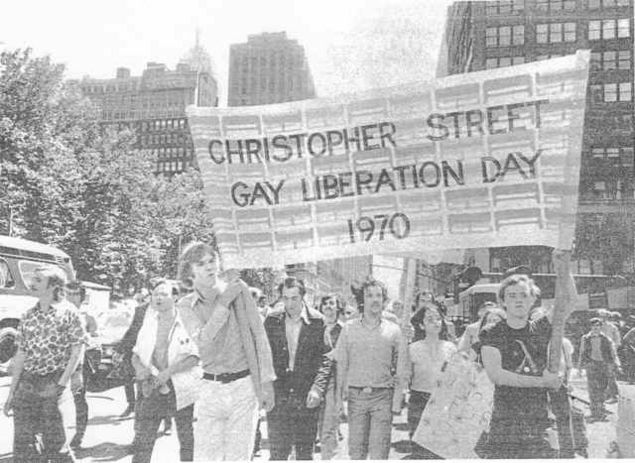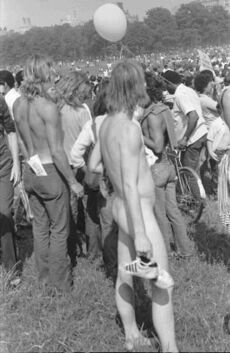Difference between revisions of "Christopher Street Liberation Day March"
| (8 intermediate revisions by 2 users not shown) | |||
| Line 2: | Line 2: | ||
'' | '' | ||
| − | [[Image:Christopher Street Liberation Day.jpg|thumb|center|635px|Courtesy of the Lesbian Herstory Archives.]] | + | [[Image:Christopher Street Liberation Day.jpg|thumb|center|635px|Image taken from ''Gay Flames Pamphlet'', no. 7. Courtesy of the Lesbian Herstory Archives.]] |
| − | A year after the rebellion at the Stonewall Inn, LGBT people from across New York City gathered to celebrate the first anniversary of the gay liberation movement. Christopher Street Liberation Day (CSLD) was a rare moment of unity among New York City's divergent gay groups, who came together "despite political and social differences" to "affirm our pride, our lifestyle and our commitment to each other."[[Image:Naked CSLD.jpg|thumb|right|upright|Marchers relax in Central Park. Photograph by Richard C. Wandel. Courtesy of the Lesbian, Gay Bisexual & Transgender Community Center National History Archive.]]<ref>Christopher Street Liberation Day Committee, "Welcome," Gay Liberation Front (GLF) N.Y. Organizational File, Lesbian Herstory Archives, Brooklyn, NY.</ref> To accommodate the interests of the many different groups participating, the Christopher Street Liberation Day Committee named the days leading up to the march "Gay Pride Week," when individual organizations could host their own events and activities. Throughout the week, gay liberationists took part in everything from dances, movie nights, and workshops to | + | A year after the rebellion at the Stonewall Inn, LGBT people from across New York City gathered to celebrate the first anniversary of the gay liberation movement. Christopher Street Liberation Day (CSLD) was a rare moment of unity among New York City's divergent gay groups, who came together '''"despite political and social differences"''' to '''"affirm our pride, our lifestyle and our commitment to each other."'''[[Image:Naked CSLD.jpg|thumb|right|upright|Marchers relax in Central Park. Photograph by Richard C. Wandel. Courtesy of the Lesbian, Gay Bisexual & Transgender Community Center National History Archive.]]<ref>Christopher Street Liberation Day Committee, "Welcome," Gay Liberation Front (GLF) N.Y. Organizational File, Lesbian Herstory Archives, Brooklyn, NY.</ref> To accommodate the interests of the many different groups participating, the Christopher Street Liberation Day Committee named the days leading up to the march "Gay Pride Week," when individual organizations could host their own events and activities.<ref>Toby Marotta, ''The Politcs of Homosexuality'' (Boston, MA: Houghton Mifflin Company, 1981), 168.</ref> Throughout the week, gay liberationists took part in everything from dances, movie nights, and workshops to [[Consciousness-Raising]] groups and demonstrations in support of legal reform.<ref>Gay Pride Week Flyer, Gay Activists Alliance NY & NJ, Organizational File, Lesbian Herstory Archives.</ref> |
On the morning of June 28th, 1970, gay activists convened for the first annual Christopher Street Liberation Day March. Gathering on Christopher Street, marchers made their way up 6th Avenue to Central Park, where they spent the afternoon listening to speeches, hanging out on the lawn, and reveling in the excitement of having been part of the first gay pride march in history. Although the march began with only a few hundred participants, more and more individuals joined along the way. By the time the first marchers reached Central Park, thousands followed behind them. | On the morning of June 28th, 1970, gay activists convened for the first annual Christopher Street Liberation Day March. Gathering on Christopher Street, marchers made their way up 6th Avenue to Central Park, where they spent the afternoon listening to speeches, hanging out on the lawn, and reveling in the excitement of having been part of the first gay pride march in history. Although the march began with only a few hundred participants, more and more individuals joined along the way. By the time the first marchers reached Central Park, thousands followed behind them. | ||
| − | Christopher Street Liberation Day became an annual event, and today, | + | Christopher Street Liberation Day became an annual event, and today, gay pride parades take place in cities across the country and around the world. These parades, which feature prominent politicians and corporate-sponsored floats, often seem to bare little resemblance to the early marches. Nonetheless, they remain an important way for LGBT individuals to celebrate their history and affirm their unity, pride, and power. |
| − | '''Bebe Scarpi, Jerry Hoose, and Michael Lavery remember the first Christopher Street Liberation Day March, and reflect on everything that it has become:''' | + | [http://www.youtube.com/watch?v=RQc3OCI_iis| '''Bebe Scarpi, Jerry Hoose, and Michael Lavery remember the first Christopher Street Liberation Day March, and reflect on everything that it has become:'''] |
| − | + | Return to [[Gay Liberation in New York City]]. | |
| − | |||
| − | |||
| − | |||
| − | |||
| − | |||
| − | |||
| − | |||
| − | |||
| − | |||
| − | |||
| − | |||
| − | Return to [[Gay Liberation in New York City]] | ||
| − | |||
===Categories=== | ===Categories=== | ||
| Line 35: | Line 22: | ||
Gay Pride Parade, | Gay Pride Parade, | ||
Christopher Street Liberation Day | Christopher Street Liberation Day | ||
| − | |||
===Contact=== | ===Contact=== | ||
Latest revision as of 12:34, 28 September 2011
This page focuses on the Christopher Street Liberation Day March. The first gay pride march to be held in New York City, it commemorated the one-year anniversary of the Stonewall Rebellion.
A year after the rebellion at the Stonewall Inn, LGBT people from across New York City gathered to celebrate the first anniversary of the gay liberation movement. Christopher Street Liberation Day (CSLD) was a rare moment of unity among New York City's divergent gay groups, who came together "despite political and social differences" to "affirm our pride, our lifestyle and our commitment to each other."
[1] To accommodate the interests of the many different groups participating, the Christopher Street Liberation Day Committee named the days leading up to the march "Gay Pride Week," when individual organizations could host their own events and activities.[2] Throughout the week, gay liberationists took part in everything from dances, movie nights, and workshops to Consciousness-Raising groups and demonstrations in support of legal reform.[3]
On the morning of June 28th, 1970, gay activists convened for the first annual Christopher Street Liberation Day March. Gathering on Christopher Street, marchers made their way up 6th Avenue to Central Park, where they spent the afternoon listening to speeches, hanging out on the lawn, and reveling in the excitement of having been part of the first gay pride march in history. Although the march began with only a few hundred participants, more and more individuals joined along the way. By the time the first marchers reached Central Park, thousands followed behind them.
Christopher Street Liberation Day became an annual event, and today, gay pride parades take place in cities across the country and around the world. These parades, which feature prominent politicians and corporate-sponsored floats, often seem to bare little resemblance to the early marches. Nonetheless, they remain an important way for LGBT individuals to celebrate their history and affirm their unity, pride, and power.
Return to Gay Liberation in New York City.
Categories
Gay Liberation, New York City, Gay Pride Week, Gay Pride Parade, Christopher Street Liberation Day
Contact
Lindsay Branson: lindsay.branson@gmail.com
References
- ↑ Christopher Street Liberation Day Committee, "Welcome," Gay Liberation Front (GLF) N.Y. Organizational File, Lesbian Herstory Archives, Brooklyn, NY.
- ↑ Toby Marotta, The Politcs of Homosexuality (Boston, MA: Houghton Mifflin Company, 1981), 168.
- ↑ Gay Pride Week Flyer, Gay Activists Alliance NY & NJ, Organizational File, Lesbian Herstory Archives.

